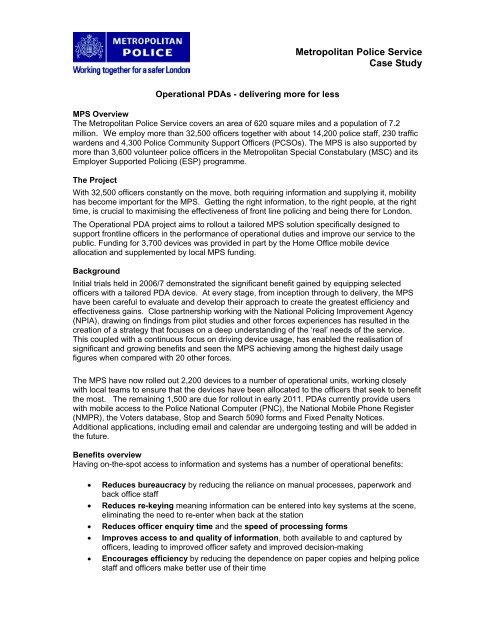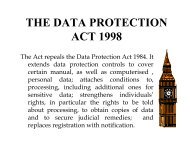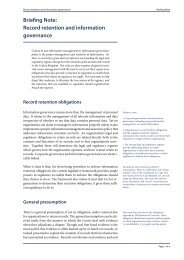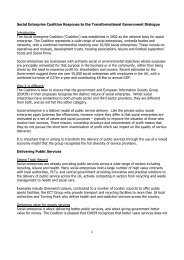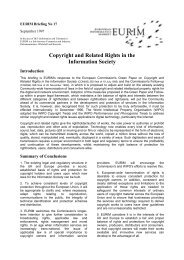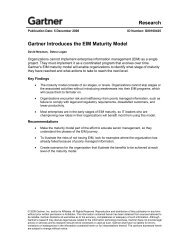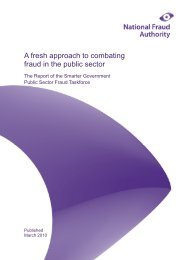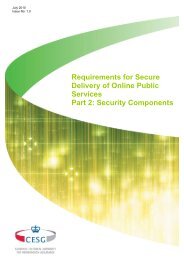Metropolitan Police Service Case Study - Eurim
Metropolitan Police Service Case Study - Eurim
Metropolitan Police Service Case Study - Eurim
Create successful ePaper yourself
Turn your PDF publications into a flip-book with our unique Google optimized e-Paper software.
<strong>Metropolitan</strong> <strong>Police</strong> <strong>Service</strong><br />
<strong>Case</strong> <strong>Study</strong><br />
Operational PDAs - delivering more for less<br />
MPS Overview<br />
The <strong>Metropolitan</strong> <strong>Police</strong> <strong>Service</strong> covers an area of 620 square miles and a population of 7.2<br />
million. We employ more than 32,500 officers together with about 14,200 police staff, 230 traffic<br />
wardens and 4,300 <strong>Police</strong> Community Support Officers (PCSOs). The MPS is also supported by<br />
more than 3,600 volunteer police officers in the <strong>Metropolitan</strong> Special Constabulary (MSC) and its<br />
Employer Supported Policing (ESP) programme.<br />
The Project<br />
With 32,500 officers constantly on the move, both requiring information and supplying it, mobility<br />
has become important for the MPS. Getting the right information, to the right people, at the right<br />
time, is crucial to maximising the effectiveness of front line policing and being there for London.<br />
The Operational PDA project aims to rollout a tailored MPS solution specifically designed to<br />
support frontline officers in the performance of operational duties and improve our service to the<br />
public. Funding for 3,700 devices was provided in part by the Home Office mobile device<br />
allocation and supplemented by local MPS funding.<br />
Background<br />
Initial trials held in 2006/7 demonstrated the significant benefit gained by equipping selected<br />
officers with a tailored PDA device. At every stage, from inception through to delivery, the MPS<br />
have been careful to evaluate and develop their approach to create the greatest efficiency and<br />
effectiveness gains. Close partnership working with the National Policing Improvement Agency<br />
(NPIA), drawing on findings from pilot studies and other forces experiences has resulted in the<br />
creation of a strategy that focuses on a deep understanding of the ‘real’ needs of the service.<br />
This coupled with a continuous focus on driving device usage, has enabled the realisation of<br />
significant and growing benefits and seen the MPS achieving among the highest daily usage<br />
figures when compared with 20 other forces.<br />
The MPS have now rolled out 2,200 devices to a number of operational units, working closely<br />
with local teams to ensure that the devices have been allocated to the officers that seek to benefit<br />
the most. The remaining 1,500 are due for rollout in early 2011. PDAs currently provide users<br />
with mobile access to the <strong>Police</strong> National Computer (PNC), the National Mobile Phone Register<br />
(NMPR), the Voters database, Stop and Search 5090 forms and Fixed Penalty Notices.<br />
Additional applications, including email and calendar are undergoing testing and will be added in<br />
the future.<br />
Benefits overview<br />
Having on-the-spot access to information and systems has a number of operational benefits:<br />
<br />
<br />
<br />
<br />
<br />
Reduces bureaucracy by reducing the reliance on manual processes, paperwork and<br />
back office staff<br />
Reduces re-keying meaning information can be entered into key systems at the scene,<br />
eliminating the need to re-enter when back at the station<br />
Reduces officer enquiry time and the speed of processing forms<br />
Improves access to and quality of information, both available to and captured by<br />
officers, leading to improved officer safety and improved decision-making<br />
Encourages efficiency by reducing the dependence on paper copies and helping police<br />
staff and officers make better use of their time
<strong>Metropolitan</strong> <strong>Police</strong> <strong>Service</strong><br />
<strong>Case</strong> <strong>Study</strong><br />
Feedback from officers<br />
• 73.1% officers surveyed believed that the PDA helped to improve their personal operational<br />
performance.<br />
“I can do checks quicker and easier and therefore perform a more thorough investigation at<br />
the time.”<br />
“I love the 5090 (Stop and Search) aspect as this saves significant time in duplicating from<br />
pocket book to 5090 and then to the stops database.”<br />
“Its ease of use and time saving encourages you to be more proactive and productive.”<br />
• 21% have said PDAs have helped to improve their confidence.<br />
“It helps me to check information in written form and saves me double checking information<br />
given over the radio. It helps increase my confidence because it looks very professional, I<br />
know that I have the empowerment to find the information I need in the order I need it and not<br />
have to recall given info over the radio. It’s great!”<br />
“Being able to access information quicker allows officers to be dynamic and more<br />
professional on the streets.”<br />
Time savings<br />
By modeling each process before and after the deployment of the devices, MPS analyses<br />
estimate that with some applications, such as Stop and Search and PNC name checks, it can<br />
save up to five minutes of an officer’s time per transaction.<br />
Summary - delivering more for less<br />
By ensuring the Operational PDAs are deployed to the officers that will benefit the most, the MPS<br />
is ensuring these devices deliver more for less. The rollout of these devices improves the service<br />
we provide to the public and is directly supportive of the confidence for our communities and<br />
safety for the public aspect of the MPS policing priorities.<br />
The devices reduce the need for officers to go back to the station to re-key information, speeding<br />
up enquiry times and forms processing, reducing paperwork and helping to improve the quality of<br />
information to aid on the spot decision-making. In addition to this, PDAs also benefit members of<br />
the public who are helping us with our enquiries, as direct access to key information allows<br />
enquiries to be completed at a faster pace, helping to minimise disruption to the individual.<br />
With the potential to save up to five minutes of an officer’s time per transaction and with<br />
thousands of these types of transactions conducted every week, it means officers can dedicate<br />
more of their time patrolling the streets and keeping the city safe for Londoners and visitors.


